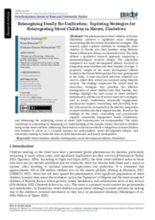The phenomenon of street children in Harare, Zimbabwe, presents a significant social challenge, necessitating effective family reunification strategies. This research paper explores methods to reintegrate street children in Harare into their families, using Rational Emotive Behaviour Theory as a theoretical lens. The study utilised a qualitative research approach, employing a phenomenological research design. The population comprised ten social development officers involved in integrating street children into their families of origin. A purposive sample of ten social development officers located in the Harare Metropolitan Province participated in the study. A semi-structured interview schedule was used to collect data, which was analysed using thematic analysis. The findings underscore the critical need for innovative strategies that prioritise the effective reintegration of street children into their families. Key findings highlight the root causes of street children's homelessness and the use of several innovative strategies, such as family conferences, community engagement, psychosocial support, counselling, and providing families with resources as essential for the effective integration of street children into their original families. Based on the findings of the study, counselling and psychosocial support, community engagement, family conferences, and addressing the underlying causes of street child homelessness are recommended. The study contributes by deepening our understanding of the complex factors that lead to children being on the street and how addressing those factors could ensure effective integration of street children into families. It serves as a valuable resource for policymakers, social development officers, and researchers seeking to tackle the issue of child homelessness and family reintegration.

